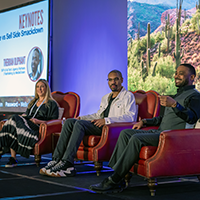cookies
-
AI
The Best of AdMonsters PubForum 2024: Curated Deals, Cookieless Targeting, and AI
Ready for a round-up of the best and boldest moments from AdMonsters PubForum 2024? We’re talking curated deals, cookieless targeting, and AI-powered strategies. Our publisher speakers packed these sessions with game-changing insights.
-
AI
Marketers Can Expect the Unexpected and Watch for Innovation in 2025
As we look toward 2025, marketers are facing a host of challenges and opportunities brought on by a tumultuous 2024. Even for an industry that likes to talk about transformation, the degree to which the old order is changing in the digital advertising ecosystem is truly rare.
-
AI
Best of AdMonsters: Must-Read Ad Tech Articles of 2024
2024 has been a wild ride for ad tech, and AdMonsters has been right there on the front lines, reporting every twist, turn, and unexpected plot development. In this listicle, we’re diving into AdMonsters’ highlights—articles that shook up the conversation and provided actionable insights for anyone in the ad tech trenches.
-
cookies
The Untapped Opportunity of Unaddressable Inventory
Discover how publishers can turn unaddressable inventory into a revenue goldmine. Digiseg CEO, Søren H. Dinesen, explains how public data and IP-based insights help bridge the CPM gap and maximize value in a post-cookie world.
-
AI
The Great Data Smackdown: Buy Side vs. Sell Side Strategies Collide
With the buy and sell sides constantly vying for the upper hand on data strategies, it can be hard to find common ground. In a heated debate at AdMonsters PubForum Scottsdale, representatives from each camp took the gloves off, trading blows over transparency, identity, and creative optimization.
-
cookies
Owning Identity in a Post-Cookie World: Why Publishers Need to Get Real About Data
As third-party cookies disappear from the digital advertising scene, publishers are waking up to a harsh reality: it’s time to rethink how they do business. For years, the industry has buzzed about data transformation, revenue diversification, and the importance of privacy regulations. But one key element is often overlooked — how to build a solid identity strategy that can reliably function within both the company and with external partners.
-
cookies
Beyond Compliance: Adapting to Privacy-Centric Platforms and Consumer Expectations
As online privacy regulations tighten, brands must adapt quickly to maintain consumer trust and stay compliant. Charles Simon, VP of Privacy Advertising Standards at RTB House explores how new laws and Google’s Privacy Sandbox are reshaping data strategies and the future of advertising.
-
cookies
This Campaign Season, Vote to Embrace Cookieless
Cookieless advertising opens access to millions of untapped voters across Safari and Firefox. This election season, candidates embracing it could gain the edge needed to win key swing states. Eric Wheeler, CEO of 33Across, unpacks how cookieless environments offer higher ad performance, faster loads, and clearer paths to victory.
-
cookies
How Self-Serve Platforms Are Revolutionizing Ad Tech and Empowering Publishers
Toms Panders of Setupad explains how self-serve platforms are reshaping ad tech, empowering publishers to take control, boost efficiency, and overcome industry challenges.
-
cookies
It’s Time to Unlock Audience Amplification: Share Your Insights Now!
With publishers facing challenges like third-party cookie deprecation and declining referral traffic, they need answers right now. Take our survey to uncover new audience amplification strategies to drive revenue beyond your website.









